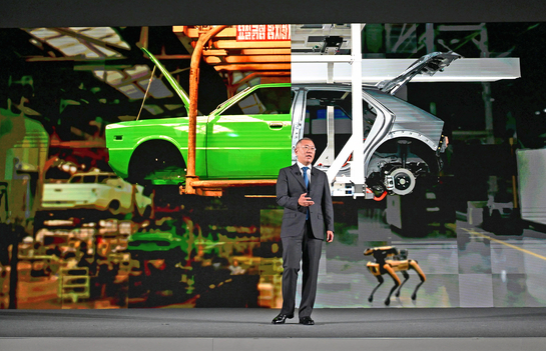
 >
>
>
>
2023.11.15
Hyundai Motor breaks ground for Korea's first EV plant in Ulsan

BY SARAH CHEA, Korea
JoongAng Daily - Ground was broken Monday for Hyundai Motor’s 2 trillion won
($1.5 billion) electric vehicle factory in Ulsan as the automaker accelerates
the shift to electrification despite the faltering global demand for EVs.
It will be the first
EV-dedicated plant in Korea and the world’s third-largest automaker’s first
domestic automotive manufacturing plant in 29 years since the last one was
built in Asan, South Chungcheong, in 1996.
Situated on a
548,000-square-meter site in Ulsan, the plant will have 200,000 annual
capacity. Construction will finish in 2025, with mass production planned to
start in the first quarter of 2026.
GV90, Genesis’s
large-size electric SUV, will be the first model manufactured in the Ulsan
factory.
“The new
EV-dedicated plant in Ulsan is the beginning of a promising future for the next
50 years and the era of electrification,” Hyundai Motor Group Executive Chair
Euisun Chung said Monday at the groundbreaking ceremony.
“A half-century ago,
in Korea, a wasteland for automobiles, Hyundai Motor succeeded in developing
our independent model and internalizing equipment and auto parts,” Chung said.
“The accumulated technology in Ulsan nourished us to build factories overseas in
countries like the United States and India, which helped Hyundai to take a leap
forward to become a global brand.”
Hyundai Motor said the Ulsan plant will prioritize the safety and convenience of their employees by applying an innovative manufacturing platform including demand-driven, AI-based intelligent control systems.
A smart logistics
system will be applied, including automated parts logistics, which will help it
diversify vehicle models, respond to global market changes and automate
Assembly facilities to improve productivity and quality.
Solar power panels
and upcycled concrete panels will be applied to the building facade, making it
a sustainable plant that minimizes carbon emissions.
Chung emphasized the
new EV plant builds on the vision of Hyundai's founder Chung Ju-yung, who
believed the car industry would become the cornerstone of the Korean economy
and underpin the country’s industrial development.
More than half a
century ago, he chose Ulsan as the place to help create a better outlook and
realize Korea’s mobility dreams. Now, the new EV plant will build on that
legacy with a global impact, Hyundai said.
“We have the world's
greatest strength, and that strength is the world’s best craftsmen,” the late
founder Chung said in a video reproduced through AI. “I am confident that
thanks to their ability and dedication, Korean cars, our cars, will soon take
the world by storm.”
Hyundai also opened
an exhibition presenting the heritage of Hyundai's journey that included a
display of a restored Cortina, the first vehicle produced at the Ulsan plant.
The exhibition will be open to the public from January next year.
Hyundai’s new EV
plant comes despite many global automakers like General Motors and Ford
announcing a halt or delay in their EV investment amid the slowing demand for
EVs.
“EV demand will
constantly grow in a broad framework, so Hyundai Motor will bend the rules to
[proceed with the investment],” Chung said.
Hyundai is also
building a $5 billion EV plant in Georgia, which will start mass production in
late 2024.
General Motors
recently said it will delay the production at its joint battery plant with LG
Energy Solution in Tennessee by a few months. The Tennessee plant in Spring
Hill, which was set to become operational at the end of the year, will start
operation early next year.
The U.S. automaker
also withdrew its target of producing 400,000 EVs by the first half of next
year amid the weak demand.
Ford also said it
will delay the operation at its Kentucky plant — a joint venture with SK On —
amid weakening EV sales.
Tesla CEO Elon Musk
hinted at a possible delay in the construction of a plant in Mexico and the
mass production of its Cybertrucks after it reported a 44 percent fall in net
profit in the third quarter compared to a year earlier.